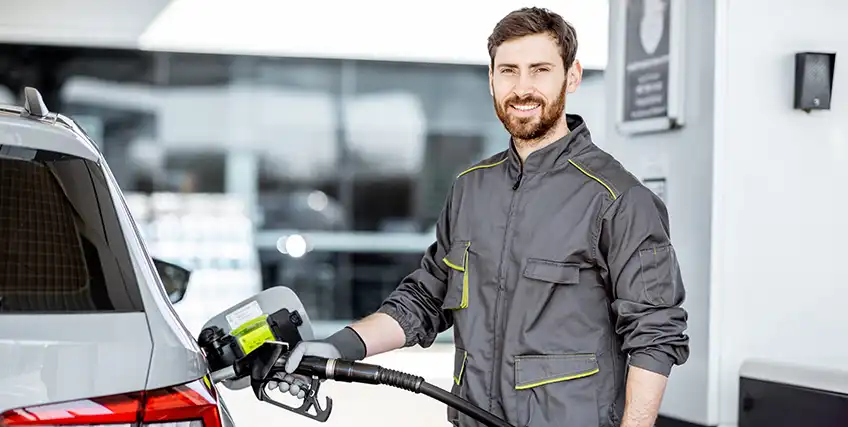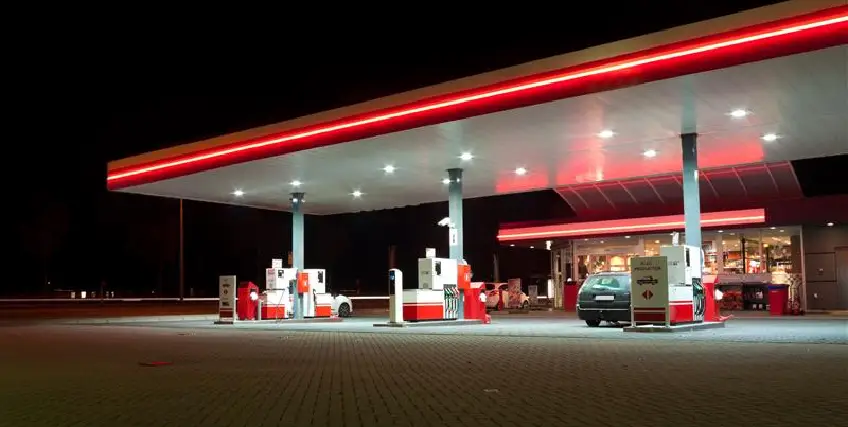What Lenders Look for in Gas Station Loan Applications: A Roadmap for First-Time Applicants
February 2, 2025 | Last Updated on: February 2, 2025

Gas station loans are necessary for many small business owners, whether you’re building a new gas station, upgrading a gas station you already own, or even acquiring a business from someone else. These loans can be used to cover a wide variety of costs, from purchasing commercial property to renovating buildings, paying for environmental expenses, buying inventory for your convenience store, adding a car wash, or upgrading pumps and tanks.
If you’re applying for a gas station loan for the first time, it’s important to first understand what lenders are looking for to better your chances of loan approval. By preparing ahead of time and understanding lenders’ eligibility criteria, you’ll not only make the application process easier but also better your chances of getting the cash you need.
Here is everything you need to know about gas station loans, lenders to consider, and how first-time applicants can find the best possible loans and terms for their small business.
Gas Station Loans, Lenders, and Loan Types
There are many different types of gas station loans to consider, depending on what you need to buy and how much you plan to borrow. These loans are offered by traditional banks, credit unions, and other private lenders, and some gas station loans may even be backed by government programs.
Here are some typical borrowing options to consider for a gas station:
- Conventional loans
- Equipment financing loans
- Commercial real estate loans
- Gas station hard money lenders
Gas station businesses present unique risks and eligibility factors that may make it tricky to qualify for funding. Everything from fluctuating fuel prices to environmental concerns and local regulations can affect your bottom line as well as your ability to get approved for a loan to buy a gas station.
Consider the right loan for you
There are many different financing solutions available, depending on factors like your history and creditworthiness. Not all loan options will be right for your situation, though, so it’s important to consider all types of financing before you start submitting applications.
- How soon do you need the money? Some lenders offer conditional approval —and in some cases, even funding — in a matter of days, while other options (like SBA 7 loans) can take weeks or even months to get through the process. The right loan for you can depend heavily on your personal timeline.
- How much do you need to borrow? Lenders set their loan limits by the type of loan, borrower qualifications, and even where you’re located.
- What sort of repayment terms fit your budget? The right loan for you also hinges on what you can afford to repay. Your payment will depend on how much you borrow, the repayment term period you choose, your interest rate, and any fees, so keep your monthly budget in mind.
- How much will you pay for the debt? Those fees and gas station loan rates determine how much you’ll pay for that gas station loan. Lenders can charge origination fees, funding fees, interest rates, and more, so calculate your total cost before making a decision.
- Are there alternatives already available to you? Rather than applying for a new gas station loan, you may be able to get the funding you need for certain projects using other resources. For example, you could refinance your current gas station, pulling out equity to use as working capital. If you have a business credit card or business line of credit, you may already have access to the cash you need for renovations, repairs, or other improvements.
Submitting Gas Station Loan Applications: Lenders’ Biggest Considerations
It’s important to understand what you’re up against to overcome the challenges of gas station financing and get your hands on the funds you need to open a new gas station, pay for upgrades and renovations if you’re already a gas station owner, or even buy an existing gas station.
Once you know what gas station loan lenders are looking for, you can better tailor your loan application and make yourself a more enticing candidate. This will improve your chances of approval for business financing as well as secure the best possible loan terms.
Here are some of the most important loan factors gas station lenders will be evaluating.
Your business experience
Your history and track record as a business owner, particularly within the gas station industry, can impact your likelihood of getting a gas station loan. If you have business ownership and/or management history, it shows that you are more likely to understand how to start a new business and manage the finances successfully. Lenders will also want to look at any other relevant business financials as well as your business credit score.
Your personal history is important, too, including your financial stability and personal credit history. If your business can’t qualify for a gas station loan, lenders may want you to offer a personal guarantee for the debt.
Financial statements and performance
If you already have a small business, expect lenders to request any relevant financial statements such as profit and loss statements (P&Ls), balance sheets, previous tax returns, cash flow statements, and more. These documents can be used to demonstrate things like profitability and positive financial performance, both of which are important when it comes to repaying a gas station loan.
Commercial lenders will also look at your business’s debt-to-income ratio (DTI) and profitability. These factors show that you can generate revenue and limit expenses to improve profit margins with a new company.
Collateral and/or a personal guarantee
Depending on the type of loan, your loan amount, and how the money will be used, you may need to offer collateral for your commercial gas station loan. Lenders will often hold assets like property and equipment as collateral to secure loans, especially when you take out equipment loans or commercial real estate loans to buy a gas station property.
Unsecured commercial loans are also available to borrowers who qualify. If you’re a first-time applicant or don’t have a strong enough business history and credit score, your lender may want you to also offer a personal guarantee for the debt.
Business plan and strategy
Before lending you tens or even hundreds of thousands of dollars, lenders will want to see that you have your ducks in a row. This usually means providing them with a comprehensive business plan that spells out your strategy for growth and success.
A strong business plan will include financial projections as well as risk mitigation strategies. How will you handle volatile fuel prices or competitors? Who is your customer base and what do local market analyses tell you about the area? How much will it take to get up and running and fund operations annually, and how much do you expect to make?
Environmental and regulatory compliance
Gas stations are responsible for the majority of petroleum contamination events in the U.S., and the price tag for remediating those spills or leaks is not cheap. Before approving small business loans, lenders will want to see that entrepreneurs have done their due diligence regarding environmental reports and required insurance coverage.
You’ll likely need to get inspections to identify any potential contamination risks, conduct a thorough site history, inspect new or existing tanks, and more. You’ll also be expected to be in compliance with all local, state, and federal regulations. These include zoning requirements, health and safety regulations, EPA guidelines, and fuel metering accuracy, and your lender will likely require copies of these reports and licenses.
Many financing options will require you to obtain insurance coverage specifically for your business. Fuel distribution insurance policies are available through many carriers and can cover your property, equipment, and inventory, as well as protect you from liability in the event of an accident.
Factors That Strengthen Your Gas Station Loan Application
There are a few things you can do upfront to improve your chances of approval for a gas station loan. Lenders will want to see that you’re a strong candidate who is both able and likely to repay the debt as agreed before offering you the funds to start, renovate, or buy a gas station.
Some factors that will strengthen your application include:
- A strong business credit score and personal credit history
- Prior experience managing and/or owning a small business, especially another gas station or similar company
- A clear and well-developed business plan that outlines your market conditions, competition, and profitability as well as how you plan to use the borrowed funds
- Enough working capital on hand to cover any unexpected expenses and/or down payments required for your loan program
The better structured your loan request and business plan, and the more preparation you can do to show to potential lenders, the better your chances are of loan approval.
Common Mistakes First-Time Applicants Make
If you’re applying for your very first gas station loan or are even trying to start a business for the first time, there are some common mistakes that crop up. By identifying and avoiding them, you’ll be better prepared to start your new business and get loan approval along the way.
- Underestimating the paperwork. The importance of financial documentation cannot be understated when applying for a business loan, especially if you’re trying to borrow a large amount of money or take out a loan through a Small Business Administration (SBA) backed lender. The accuracy and thoroughness of these documents are imperative, and having a well-prepared business plan will make the entire application process smoother.
- Failing to prepare for your market. If you want your business to be successful, be sure to do an in-depth investigation first. This means carefully considering your proposed business operations, local market, risks, and competition before you make any big decisions.
- Overlooking regulations. In order to start a new gas station, you’ll be required to meet environmental and licensing requirements at a number of levels. If you don’t plan for these ahead of time, though, and do your due diligence, you might find yourself facing some lengthy (and costly) regulatory hurdles or even footing the bill for big repairs and updates.
- Lack of a solid plan. No matter what type of business you want to start, planning for the unexpected is paramount to your success. Consider all types of contingencies, such as fuel price spikes and economic downturns, and how you’ll financially weather those storms before they arise.
Final Thoughts
Taking out a loan is a necessary step for many future gas station owners, offering the cash these entrepreneurs need to purchase land, build, conduct testing, buy inventory, pay for licensing, and more. When applying for gas station loans, lenders will look at certain criteria before offering approval, such as your business history, credit score, financial records, and even your business plan.
Preparing for this process ahead of time can help you create the most thorough gas station loan application possible and improve your chances of getting approved.
FAQs about Gas Station Loans and Lenders
What kind of lenders offer loans to buy a gas station?
Gas station loans are available through many banks, credit unions, online lenders, and small business lenders. If buying a franchise location, you may even be able to get financing through the franchisor directly.
Do I need a down payment to buy a gas station?
Many business loans, like SBA loans, often require a down payment. While some lenders will allow you to finance 100% of your expenses, others will expect you to cover an upfront portion out of pocket.
Can I get a loan to buy a convenience store?
Gas station acquisition financing is available to buy an existing convenience store, if you don’t want to build and start a new store from the ground up. You’ll want to do your due diligence before buying an existing gas station, though, by getting inspections, checking licensing records, conducting testing, and more.
What big expenses are involved with opening a gas station?
Starting a new gas station involves buying or leasing land, a building, gas tanks, pumps, equipment, signage, inventory, and optional features like a car wash. You’ll also need to cover any licenses and regulatory requirements, like inspecting fuel tanks or calibrating pumps.




